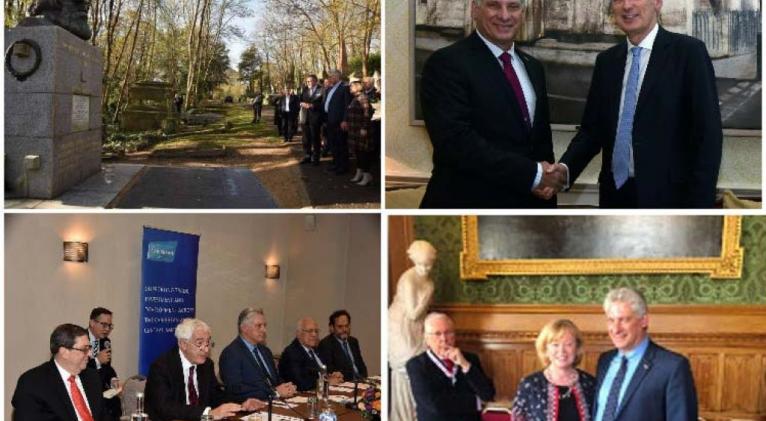Cuban President Concludes Transit Visit to UK

London, Nov 14 (Prensa Latina) Cuban President Miguel Diaz-Canel on Wednesday ended a transit visit to the United Kingdom, as the culmination of his first tour of Europe and Asia after taking office in April.
Diaz-Canel arrived in London on Monday from Laos, his last stopover in a tour that started in France, with a brief visit, and continued in Russia, the Democratic People's Republic of Korea, China and Vietnam.
During his stay in London, Diaz-Canel was welcomed by several local officials and met with representatives of the British Cuba solidarity movement and from the Cuban Embassy here.
He noted his meeting with British Finance Minister Philip Hammond, who is considered the second most important figure in the British Government, with who he reviewed the state of bilateral relations.
On his Twitter account, Diaz-Canel recalled Hammond's visit to Cuba in 2016, when he was the British secretary of State for Foreign Affairs.
'It was the first official visit by a British foreign minister to our country since 1958,' Diaz-Canel underlined on Twitter.
The president of the Councils of State and of Ministers also met with executives from a score of British companies that are members of the Cuba Initiative, an organization that was created in 1995 to boost trade between the two countries.
When inaugurating the forum at a hotel in London, the British co-president of the Cuba Initiative, Lord David Triesman, welcomed the statesman, 'the first Cuban president who visits my country and my hometown,' he noted.
Lord Triesman, who was the British Foreign minister in the 1990s, expressed commitment to relaunch economic and commercial relations with Cuba.
In that line, he announced the holding in Havana, in the late first semester of 2019, of a meeting of the Cuba Initiative, one of three organizations that are affiliated to the Caribbean Council.
After thanking the members of that entrepreneurial committee for attending the meeting, Diaz-Canel pointed out that the creation of that institution marked the beginning of a different relationship between Cuba and the United Kingdom.
In addition, it built a bridge in cooperation and collaboration and a legacy that no one can deny, he stressed.
According to Diaz-Canel, there are grounds today that guarantee the continuity and development of that project, because we know each other and we know the obstacles and adversities to be overcome, he added.
'I think that all grounds and all possibilities exist for us to reach a new stage. A stage in which we will work with more intensity, the Cuban president underlined.
Diaz-Canel took advantage of the meeting with the Cuba Initiative to repeat his Government's will to continue to work for the development of economic, commercial and cooperation ties with its British counterpart.
He noted that Cuba expects a growth that will guarantee the main social gains achieved after the triumph of the Revolution in 1959.
However, he charged that the lengthy blockade imposed by the United States on Cuba is the biggest obstacle to the development of Cuban-British ties, due to the extraterritorial nature of the Washington-imposed sanctions.
On Tuesday, Diaz-Canel met with members of the Solidarity with Cuba Campaign and trade union leaders, whom he expressed gratitude for their friendship and affection during these nearly 60 years of the revolutionary process. He told the representatives of the solidarity movement that his transit in the United Kingdom became a working visit, obviously alluding to the busy agenda that he had in this European country.
At his meeting with Labor Party leader Jeremy Corbyn, Diaz-Canel reviewed the ties between the British social-democratic organization and the Communist Party of Cuba and verified the good state of relations between the two States.
He also met with Baroness Angela Smith of Basildone and with a group of British parliamentarians.
Diaz-Canel also met with Karen Lee, who is the coordinator of the Multi-Party Group for Cuba at the House of Commons.
He shared reflections with British politicians at the Westminster Palace.
During his tight agenda, the Cuban head of State paid tribute on Wednesday to Karl Marx at the Highgate Cemetery, in London, where the remains of the German philosopher, who is considered one of the greatest thinkers in history, are buried.
The president laid a wreath at the tomb of the communist intellectual on behalf of the Cuban people. Later, he described Marx as one of the most influential figures in the history of humankind on his Twitter account.













Add new comment